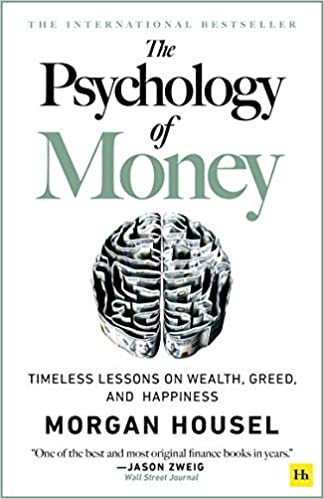
The Psychology of Money: Timeless Lessons on Wealth, Greed, and Happiness by Morgan Housel explains the psychology of spending and saving for anyone who has to deal with money and life. This is an excellent nontechnical study of this most important topic for high school students on up. If you want to acquire enough wealth to feel independent this book is for you. You can skip to chapter 20 to learn what Morgan and I do with our money.
Introduction
- We start with stories of a janitor who invested what he could in blue-chip stocks and died with an estate worth $8 million dollars and a successful businessman who went bankrupt by overspending on houses and wasting money. The premise of this book is that doing well with money has little to do with how smart you are and a lot to do with how you behave. It’s more about psychology and not so much about physics.
1. No One’s Crazy
- The decisions we make about money depend heavily on our experiences and the environment we grew up in. Although the first currency dates back to about 600 BCE, most of our current financial instruments only arrived after World War II. Prior to that time, most people worked until they died. Now we all expect to retire and have to save and invest for that day. Since modern instruments are so new, we aren’t crazy, we are just essentially newbies at it.
2. Luck & Risk
- Bill Gates attended a high school that had better computer access than most graduate schools. This allowed him to become an expert who wrote a program to do the school’s schedule among other things. Were it not for this unprecedented access he claims there would be no Microsoft. Meanwhile, his best friend who also became a computer wiz died in a mountaineering accident before he finished high school. The point here is that luck and risk are siblings. He shares other stories of people who took risks and made it big like Vanderbilt and Rockafellar who felt they had enough power to ignore some laws and indeed they did. Not all success is due to hard work and not all poverty is due to laziness. Keep this in mind when judging people. (Doug: Better yet, don’t judge people.) The world is too complex to allow 100% of your actions to dictate 100% of your outcomes.
3. Never Enough: When Rich People Do Crazy Things
- When you are young taking some modest financial risks makes sense as you have time to recover. At some point, you may need to decide that you have enough and scale back your risk. Morgan cites Bernie Madoff and Rajat Gupta as very successful investors who didn’t know when to say enough and ended up in prison after running a Ponzi scheme and engaging in insider trading. The ideas that the best games to play in a casino are none of them and that the Lotto is a tax on the poor are also instructive.
DrDougGreen.com If you like the summary, buy the book





